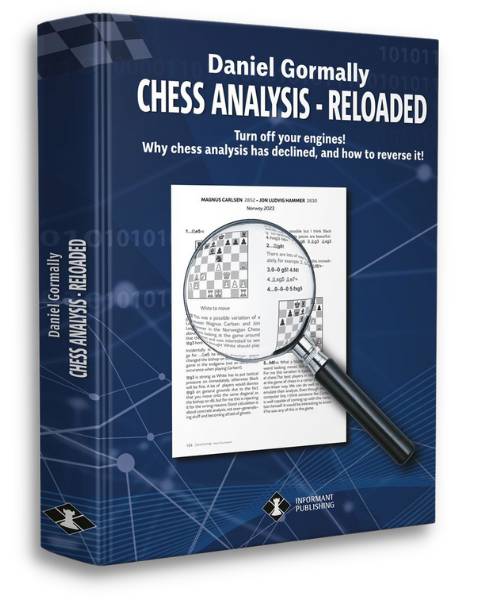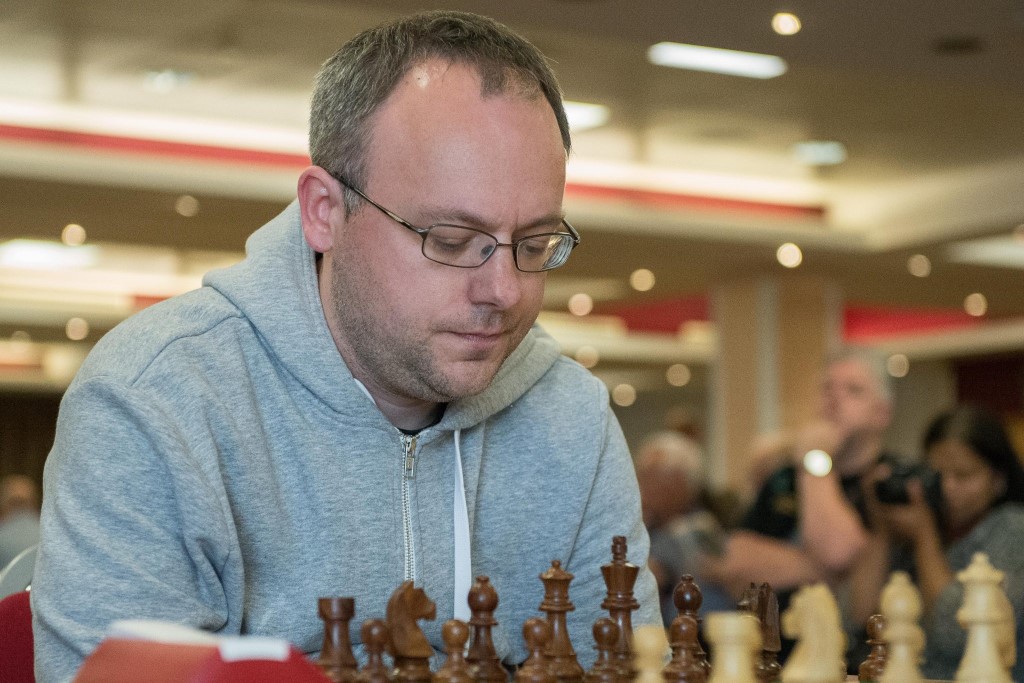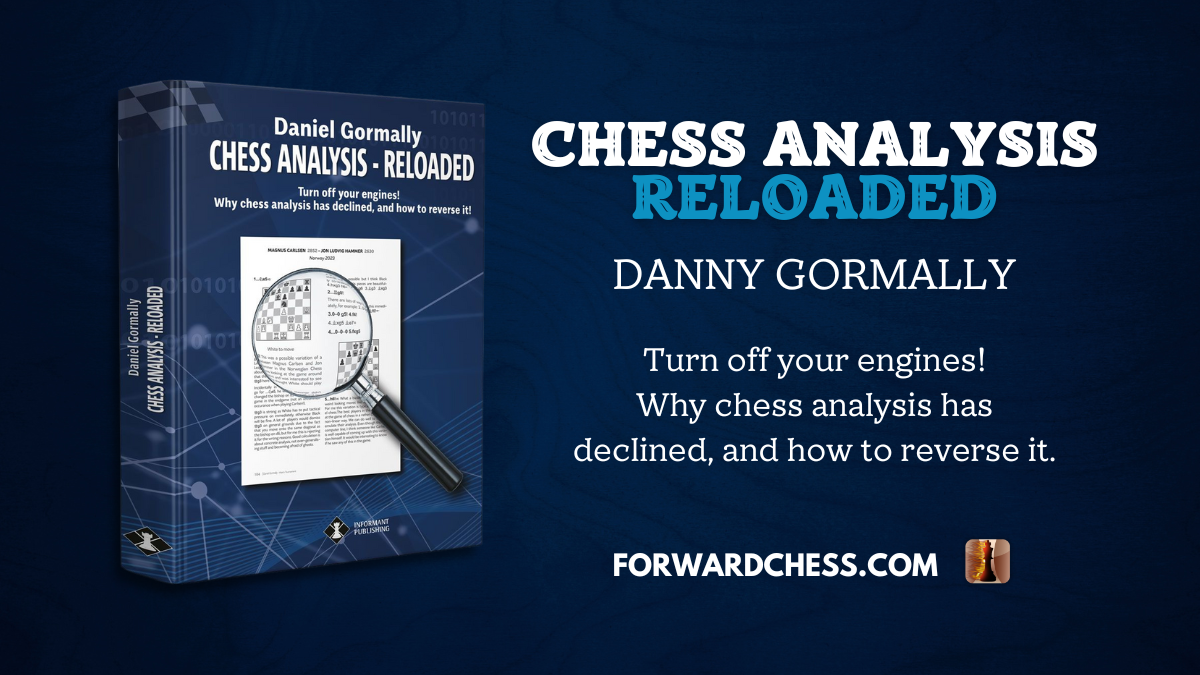Author Daniel (Danny) Gormally is known for telling it how it is, and in this post, he does exactly that – but in the context of his latest book release “Chess Analysis – Reloaded”. Enjoy his refreshing and blunt humor, and grab your copy of the book on Forward Chess.
When the Charlize Theron lookalike and name alike, the charming Charlize van Zyl, asked me to do a blog on my latest chess book “Chess Analysis-Reloaded”, her request got me thinking.
Did I want to spout the usual pretentious waffle that I tended to indulge in such scenarios, or do I give it to you straight? Hopefully the latter. Hopefully, I’ll do it quickly as well, so you can get back to the important things in life like streaming videos, posting on social media, etc.
The reason you should buy my book is:
- It’s honest.
- There’s a lot of me in it.
- You get the inside of the English chess scene.
- You get lots of references to Netflix in it, and the Mexico World cup, which you won’t get from other, more boring chess players, who have little concept of a wider world beyond their Chessbase and orange juice.

Admittedly this book is hardly a profound departure from my other works, in the sense that it is a rambling, partly autobiographical tome, where I lapse into morose self-reflection on more occasions than is necessary thus living up to my niche as the grumpy, Eeyore character of the chess world. But where it differs is that I have managed to identify why my chess career has spiraled into a funk, causing this overriding depression. Namely, the inability to analyze caused by an over-dependence on engines. The book is really about my quest to overcome this laziness and rediscover my love of analysis. Using current parlance, to become the best version of myself.
To achieve this:
- I tried to compare my ability to annotate a game to famous chess authors like Jan Timman and Yasser Seirawan.
- I compared the difference between how amateur players approach a chess position and how professionals navigate the same scenarios. Where are amateur players going wrong, if at all, and if they are how can they fix it?
- By the same token, how does engine analysis differ from human players and what can we learn from them?
- At the end, I pose a fiendish quiz to my fellow struggling chess players.
The last part was my favorite part of the book because I really enjoyed tormenting other chess players with obscure and hard positions. Some readers might find this off-putting. If professional players are finding this difficult, how am I going to cope? But I like to think that I do so in a way that anyone will find digestible, and I wanted to get across in this book that despite some lean years I am still fascinated by chess. I am fascinated by analysis, I am fascinated by the process of trying to get stronger, of what separates the very best players from the good but not so great. When Seirawan talks in his own book about how he was astounded by the depth of Kasparov’s analysis, and how many variations he sees, that is the kind of thing that intrigues me as well. What makes these players so great and how do you get there? And is it even possible to do so?
What I discovered in that chapter which really intrigued me was that there was so much crossover in the answers. And at times my subjects were wrong in the same way, like a form of mutual hypnosis. But it showed me that chess is very much a communal game. When I talk about as I often do in that dejected way, that chess is the only profession where your fellow workers will not only not support you, but they will also try to destroy you, I am only being partly honest. Writing this book reminded me that one of the joys of chess is in that companionship, that working together, that differing personalities can approach positions in entirely different ways, both in how they tackle the positions and how much time they expend in trying to work them out. It was the first time that I wrote a chapter for a book that it got me thinking, I’d like to explore this subject further, but whether there is a space for a Grandmaster who likes tormenting his fellow players with impossible positions I’m not exactly sure. The chief tormentor, that could be my U.S.P.
This is my first solo collaboration with Informant Publishing, and I hope, not the last. The editor Igor originally contacted me, partly because I like to believe that he has a lot of staid, correct chess writers, but not many who say it as it is. If you want a funky, upbeat, but at the same time depressing, journalistic type-chess book that gives you an inside view of the chess world, then this is probably the chess book for you. Think of a series of chapters that are like 10-15 clickbait YouTube videos, and you are halfway there. It is chess popcorn, it is entertainment. And better still, it will help you to improve your chess!
Get the book on Forward Chess, and take a peak inside with our free sample:
About the Author

Danny Gormally is an accomplished English chess Grandmaster and author. He earned his Grandmaster title in 2005 and reached a peak rating of 2573 in January 2006. Gormally’s chess career has been highlighted by notable achievements such as sharing first place at the Politiken Cup in 1998, winning the Challengers tournament at the 78th Hastings International Chess Congress in 2003, and tying for second place in the 2nd European Individual Championship in Liverpool in September 2006. In 2015, he tied for second place at the 102nd British Championship.
Gormally is also recognized for his contributions to chess literature, having authored multiple books. His 2016 book, “Insanity, Passion and Addiction – A Year Inside the Chess World“ is a unique perspective on his experiences in the European chess circuit, drawing comparisons to the styles of American beat writers like Charles Bukowski and Jack Kerouac, and has been well-received within the chess community.
Beyond his competitive and literary contributions, Gormally has been involved in chess commentary, coaching, and analysis, sharing his insights and quirky commentary style, which offers a refreshing alternative to the traditional image of chess. He emphasizes the importance of playing to improve calculation skills and encourages leveraging modern resources like Banter Blitz videos to understand how top players think and calculate.
- New Release: Chess Analysis – Reloaded - March 9, 2024
- Review: The Art of The Endgame – Revised Edition - February 14, 2024
- Review: Study Chess with Matthew Sadler - December 13, 2023
